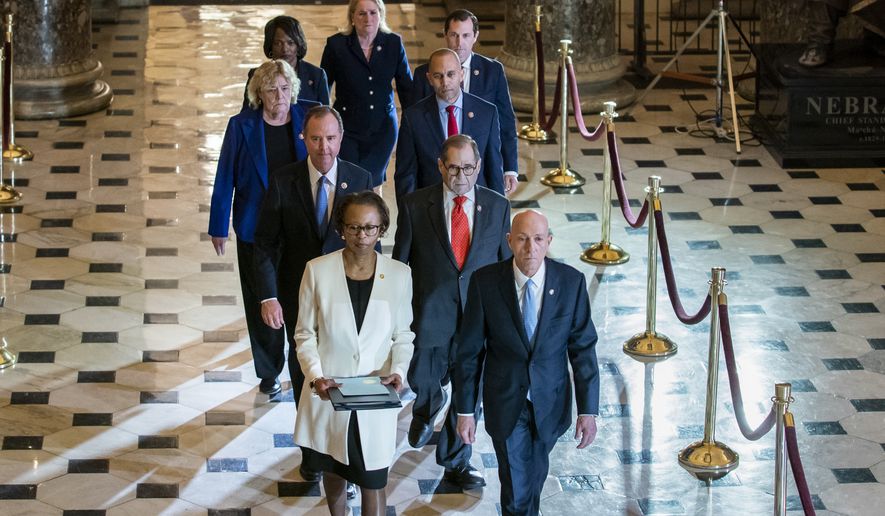President Trump could be defending himself against House Democrats’ impeachment charges at the same time he is touting his accomplishments during the State of the Union address, now that the House has sent over articles of impeachment to start a Senate trial.
A similar dichotomy was on display Wednesday. As House Democrats paraded the impeachment articles across the Capitol, Mr. Trump celebrated the signing of the first phase of a historic trade agreement with China.
The impeachment trial loomed for about a month. House Speaker Nancy Pelosi, California Democrat, held on to the two articles of impeachment while demanding that the Republican-controlled Senate conduct what she described as a fair trial that would include new witness testimony.
Mr. Trump is all but guaranteed acquittal in the Senate, where it would take a supermajority vote of 67 senators in the 100-member chamber to convict and remove him from office.
“He’s been impeached forever. They can never erase that,” Mrs. Pelosi aid.
She finally gave up on her attempts to dictate the Senate proceedings, and her chamber voted Wednesday to officially send the articles to the upper chamber.
SEE ALSO: Nancy Pelosi signs, delivers impeachment articles
The four-week impasse ended after a quick march of roughly 750 feet from one side of the Capitol to the other.
Mr. Trump slammed the impeachment saga on Twitter, calling it “another Con Job by the Do Nothing Democrats.”
The House’s 228-193 vote to transmit the articles of impeachment also deputized seven Democrats to prosecute the case and allocated the use of funds for the trial, which is scheduled to begin Tuesday.
That is just two weeks before the president is set to address the nation in front of Mrs. Pelosi’s chamber.
President Bill Clinton’s impeachment trial in 1999 took about six weeks from start to finish.
“That seems like a fairly tight deadline given what we are facing,” said Senate Majority Whip John Thune, South Dakota Republican. “If we go six days a week once we get started and get through the opening arguments and the questions — and the question of witnesses will obviously have to be answered — and if people decide they want to call witnesses, it could obviously go on for a while.”
SEE ALSO: Pelosi announces House Democratic impeachment managers
Sen. James Lankford, Oklahoma Republican, said the trial could be finished in two weeks.
Mr. Trump is facing two charges; Mr. Clinton faced four. The Feb. 4 State of the Union address wouldn’t be the first time a trial overlapped with the yearly presidential speech.
Mr. Clinton delivered his 1999 State of the Union address on Jan. 19, the same day his defense team opened its arguments countering the charges against him.
During the 1999 proceedings, the House managers made their arguments over three days and the defense took the same amount of time. Written questions from senators to both sides were considered over two days.
If witnesses are called for Mr. Trump’s trial, the process could go longer.
At least one House Republican says the president should delay the address until after the trial is completed.
“Speaker Pelosi, by delaying delivering articles of impeachment, is hoping [an] ongoing Senate trial and impeachment cloud hangs over the president during his State of the Union address to Congress. President Trump should tell her ’no games’ and tell her he’ll deliver the State of the Union only after our country clears the divisive impeachment hurdle,” Rep. Jim Banks, Indiana Republican, said this week.
Administration officials brushed aside talk of rescheduling the president’s State of the Union speech.
“It’s extraordinarily unlikely that we would be going beyond two weeks. We think this case is overwhelming for the president, and the Senate is not going to have any need to be taking that amount of time on this,” a senior administration official told reporters.
Mrs. Pelosi named seven Democratic lawmakers as impeachment managers to prosecute the case in front of the Senate. The managers include Rep. Adam B. Schiff of California, chairman of the Permanent Select Committee on Intelligence, and Rep. Jerrold Nadler of New York, chairman of the Judiciary Committee. Both led the 12-week impeachment inquiry in the House.
Democratic Caucus Chairman Hakeem Jeffries of New York and Reps. Val Butler Demings of Florida, Sylvia R. Garcia of Texas, Jason Crow of Colorado and Zoe Lofgren of California will assist the prosecution.
The impeachment managers and senators will be sworn in by U.S. Chief Justice John G. Roberts Jr. on Thursday, but the trial will not officially commence until Tuesday.
The House impeached Mr. Trump on Dec. 18 without a single Republican vote, charging him with abuse of power and obstruction of Congress.
The two articles of impeachment stem from allegations that he leveraged presidential power over foreign military aid to pressure Ukraine to investigate a political rival, former Vice President Joseph R. Biden, and purported Ukrainian meddling in the 2016 presidential election.
“President Trump put his own personal interests above the national interests, above our national security, and if not stopped, he will do it again,” Mr. Schiff said before the vote. “The appropriate remedy, indeed the only remedy, is the conviction and removal from office of President Donald Trump.”
An administration official said the articles are the weakest in the nation’s history, noting they do not charge the president with violating a law or statute.
“These articles of impeachment would be worthy of being dismissed right at the threshold,” the official said.
• Gabriella Muñoz can be reached at gmunoz@washingtontimes.com.
• Alex Swoyer can be reached at aswoyer@washingtontimes.com.




Please read our comment policy before commenting.